- Home
- Steven Brust
Dragon Page 10
Dragon Read online
Page 10
"So," I said. "Would you care to tell me what you learned?"
"Of course not," he said. "Would you care for a drink?"
"No, thanks. I'm teleporting."
"Ah, yes, certainly." He reached into his cloak and removed a small purse.
"No, no," I said. "This one's gratis."
"Indeed?"
"Yes. I learned enough to pay for the experience."
"Oh? And … " He decided not to ask what I'd learned because he knew very well how I'd answer.
Loiosh said, "Did I miss something? What did you learn?"
"Nothing. I just wanted to give Morrolan something to think about."
"I hope it was worth whatever he was going to pay you."
Morrolan said, "Are you still determined upon the course of action to which you previously referred?"
"I beg your pardon?"
"I said—"
"No, never mind. I think I got part of that. Yeah, I'm still willing to do what I can to mess up this guy's program, if you think it'll help."
"Good. We will begin the muster tomorrow. The following day you may, if you are still willing, of course, report to your unit, Cropper Company, at noon. It will be assembling on the lea below Castle Black, north of the stone wall. Look for a green banner with a black horn upon it."
I opened and shut my mouth a few times, then said, "So soon;
"If you can give me a good reason to delay, I'll consider the matter."
"I'll think about it and get back to you. But can't I just teleport to someplace where I'll do some good, instead of joining a company?"
"What makes you think the enemy will allow teleports anywhere in the area? Or, for that matter, that I will?"
"Will you?"
"No."
"I see. Well, what about your window?"
"I won't be here, I'll be with the army."
"Oh."
"Any other questions?"
"Uh … Why that company?"
"Is there another you'd prefer?"
"I haven't a clue, Morrolan. I just wondered what it is about them—"
"They'll be in the van during the first stage, which makes it most convenient for your activities, and Cropper, the Captain, is easier to work with than some. Anything else?"
"Yeah. How do I get home? I don't feel like doing my own teleport."
"Where are you going?"
"My office."
"I'll bring you."
"You mean you'll send me?"
"I was thinking of bringing you. I'd like to see where work."
"Heh. That'll shake up the staff," I said. "Sure."
"Then open your mind and think of your office."
I had him bring us to the street outside, pointed out some sights to him while I recovered, and noticed that he was attracting a certain a mount of attention: Dragonlords aren't often seen in the company of Easterners. On the other hand, no one wanted to stare too blatantly; people mind their own business in my neighborhood.
I led him through the various fronts and up into the suite of rooms I worked out of. Melestav looked up when I came in, then saw who was behind me and nearly sprang to his feet.
"Melestav," I said, "the Lord Morrolan."
Melestav didn't find anything to say, which amused me. Morrolan looked around. "If I didn't know better," he said, "I should say that this was the office of an advocate."
"What were you expecting? Bottles of poison and shelves of garrotes?"
"I'm not certain," said Morrolan. "Perhaps that is why I wanted to see it."
"Here's where I work," I said, leading the way. Kragar, whom I hadn't noticed, stepped out of our way.
"Excuse me," I said. "Kragar, the Lord Morrolan."
"We've met," said Kragar.
"Forgive me if I don't bow," said Morrolan.
I showed him in, and had him sit in the chair opposite me. "So," I said, "you need more time to pay me back. Well, maybe we can work something out."
"There is a disparity," he said, "between what you do and the surroundings in which you do it. It is interesting." Which was when I suddenly realized that he wanted to be here because he wanted to learn about me—that is, he was learning about a potential ally or possible enemy, in much the same way he would investigate military positions, or I would study someone with whom I had business. It was reasonable, but it made me very uncomfortable.
"I had the same reaction, a few days ago."
He stared at me hard for a moment, then continued looking around my office.
"Ask him if he wants a job, Boss."
"Maybe later, Loiosh."
"Well, thank you, Vlad. I'll be going now."
"I'll show you out," I said, and I did, then returned to my desk, sat down, and said, "So, Kragar, it's like this, you see … "
He waited for me to continue, his eyes narrowed, his head tilted, and his expression one of intense suspicion. At length, when I refused to finish the thought, he said, "What was he doing here?"
"Checking me out. But that isn't what I wanted to talk about."
"Oh?" he said. "It must be my latent Dragon instincts that tell me you've either done something stupid or you're going to ask me to do something unpleasant, or both."
"Both, I think."
He nodded, his expression unchanging.
"I'd like you to run things here while I'm gone. It'll be at least—"
"That's both, all right."
"—a couple of days, maybe a month or more."
He frowned and thought about it. At last he said, "I don't much like the idea. I'm an executive officer type, not a commander. That's how I like it, you know."
"I know."
He considered some more. "Offer me a lot of money."
"I'll give you a lot of money."
"All right."
"Good."
"What will you be doing?"
"Following up on your idea."
"Which one?"
"Sabotage and sundry nuisance for an army."
"I see."
"Morrolan has assigned me to a company."
"I imagine he has."
"Anything I should know about military life before I show up?"
He laughed. "I don't know where to start. For one thing, expect to hate it."
"Oh, I do."
"For another, if you start letting yourself get pushed around—I mean by your messmates, not your superior officers—it'll never stop, or else you'll have to kill someone, which won't be good for anyone."
"Got it."
"And for another, if your messmates even suspect you aren't going to be holding up your end in battle, they'll make your life miserable."
"One question."
"Go ahead."
"What's a messmate?"
"I can see," said Kragar slowly, "that you're going to need a great deal of preparation for this."
If you follow Dockside Road as it meanders generally east and a little south (following the docks, amazingly enough) you'll eventually reach a place where it opens up into a market area, from which Bacon Street springs off down a hill. Assume that the wind is from the north or west because if it is from the south or east you won't make it that far, and you'll soon see a row of short, squat, ugly brick buildings wedged right up against a very low section of the cliffs of Adrilankha. These are the slaughterhouses, and they're positioned so when the meat has been sliced, seasoned, smoked, salted, and packed it can be dumped over the cliff on shipping nets, from which it can then be stowed in the holds of the merchant ships which will try to get it to its destination before too much of it has become too disgusting to be eaten.
Go on past it, and hope the wind fortuitously changes direction right about there (nothing, but nothing, smells as bad as a slaughterhouse on a hot day) and you'll start climbing up again, and somewhere in there Bacon Street becomes Ramshead Lane, and you'll notice that the stench diminishes and changes (garbage doesn't smell quite as bad as a slaughterhouse) but doesn't go away and that the dwellings are mostly wood,
and packed tightly together, and unpainted, and you're now in South Adrilankha, and you are welcome to tell me why you bothered to come in the first place. I was there because I had family in the district.
I knew the streets here almost as well as I knew my own area, so I paid little attention as we walked past bakeries and tanners and ironmongers and witches and prostitutes, following the turnings in the road and occasionally nodding at anyone who dared to make eye contact with me, because I don't go out of my way to be intimidating to other Easterners. It is a relief, in any case, to see people who are sometimes bald and sometimes fat and sometimes short and sometimes have whiskers, because Dragaerans can't manage any of these things—what they see as better I see as more limited.
We passed a street minstrel who was singing in one of the more obscure Eastern languages, and I dropped a few orbs into his instrument case.
"Boss, was he singing what I thought he was singing?"
"A young man tells his beloved of his love for her."
" 'My little hairy testicle—' "
"It's a cultural thing, Loiosh. You wouldn't understand."
We came to a street called Strangers Road, and south of it was a neighborhood called Six Corners where everything changed at night; I know of nothing like it anywhere else in Adrilankha, or in any part of the Empire. But here is a fish shop during the day; at night the unsold fish are thrown away and it becomes a place to buy homemade untaxed liquor, especially brandy. Next to it is a bootmaker's, until night, when the boots are locked away beneath the floor and it becomes an untaxed gambling hall. That baker goes home for the day, and another man comes at night, opens the back, unfolds rows of mattresses, and turns the place into one of the most wretched brothels in the City.
I rather preferred the district in the day, though at night it felt more like home.
And then, just after passing out of Six Corners, we eventually reached a small witchcraft supply shop at the corner of two unnamed and unmarked streets, and I walked in under the awning, setting the chimes ringing. I was greeted at once by Ambrus, the cat, who emerged from under the hanging rugs and was followed by my grandfather, who parted them carefully before stepping through. "Hello, Vladimir," he said. "It is good to see you. Sit down and have tea."
Ambrus crouched before me, preparing to spring. I made a basket of my arms, caught him, and carried him past the rugs and into the shop or the house—it was the same place and hard even for me to tell which items were for sale or use by customers and which were strictly personal. For example, you'd think the self-portrait was personal, wouldn't you? Just goes to show you. Loiosh and Ambrus, having established their relationship early on, determinedly ignored one another's existence.
I sat in a grey stuffed chair, set the cat on my lap, and took the small, delicate porcelain teacup from my grandfather. It was painted blue, and the tea was red. I squeezed lemon into it, added a trace of honey, and said, "How are you, Noish-pa?"
"I am as always, Vladimir."
In other words, he knew I had something on my mind and that I wasn't just coming over to visit. The thing is, I often come over just to visit, so how did he know? But never mind that. I took a tiny sip of tea, because I knew it would be very hot. It was; it was also very good, and not in the least bitter. I could have gotten by without the honey. I should have sampled it first. I said, "I have joined the army, Noish-pa."
His eyes widened, and I was delighted to have actually managed to startle him. He said, "You have joined the army?"
"Well, after a fashion."
He leaned back a little in his chair, which was a great deal like the one I was sitting in. I suddenly realized that my own furniture tended to be like my grandfather's, as opposed to the hard wood and lightly padded stuff I had grown up with while my father was alive. "Tell me of it," he said.
"I was attacked not long ago. Beaten and threatened. It was by a man who had no reason to attack me, except to warn me to leave him alone. I'd have left him alone if he had left me alone. Now I'm going to hurt him."
"By enlisting in an army?"
"An army that is soon to attack him. I will be engaging in various special services—"
"Do you think this a good reason to enlist in an army?"
"Of course not, Noish-pa."
He cracked a quick, gap-toothed smile. "But you are doing it anyway."
"Yes."
"Very well."
He knew me, and knew when it was worthwhile to try to talk me into or out of something. He rarely tried to change my mind in any case, even when he might be able to. Loiosh flew over to him and accepted having his chin scratched. Noish-pa said, "What then do you ask me?"
"You were in the army once. What should I know?"
He frowned. "Vladimir, that was a different circumstance. I was a conscript soldier in an Eastern army; this is not the same as volunteering in an army of elfs."
"I know that."
"And we were soundly beaten in our first and only battle."
"I know that, too."
He stared off into the distance. "You will do a great deal of marching; protect your feet. Stay out of the way of officers—try not to be noticed. Do your share of latrine duty, but not more than your share, though you won't need to be told that. Sleep when you can, but you won't need to be told that, either. Trust your officers, even though they will not be trustworthy; you must trust them anyway because it is worse if you don't."
The implications of that last suggestion went home, and, in a certain sense, I became aware for the first time of just what I'd gotten myself into.
"It's not too late, Boss."
"Yes, it is."
I remembered to drink more of my tea before it got cold.
"Are you hungry, Vladimir?"
"A little."
"Come, then."
We went back into his little kitchen, and I sat on a stool at the tiny counter while he made the one thing I've never been able to get to come out right: It is an Eastern bread, only slightly raised, and pan-fried in a very light olive oil. I think the trick is getting the oil at exactly the right temperature, and judging when to turn the bread, which is just before it shows any obvious signs of needing to turn; the dough was pretty straightforward, unless Noish-pa was hiding something, which would be unlike him. In any case, I've never been able to get it right, which I regretted anew as soon as the first one hit the oil and released its aroma.
I watched my grandfather as he cooked. His concentration was total, just as when he was crafting a spell. The comparison between cooking and witchcraft has been so overdone that I can't make myself discuss it, but I'll mention I was reminded of it again.
I let the first loaf (it looked more like a large, raised square of light brown dough) cool just a bit. I took a clove of garlic, cut it in two with my teeth, and coated the top of the bread with it. When I could hold the bread without burning my fingers too much, I bit into the garlic, let it explode in my mouth, then followed it with a bite of bread. I closed my eyes to enjoy the experience, and when I opened them Noish-pa had put a glass of red wine next to my elbow. We ate in silence for a while, and I enjoyed it until I realized that this would be one of the last decent meals I ate for a while. I wondered if it would be possible to teleport out of camp late at night, get something to eat, and teleport back. No, they'd doubtless have teleport blocks in place to make sure the enemy didn't show up for reasons other than cuisine.
"You've really done it this time, haven't you, Boss?"
I didn't even tell him to shut up. I embraced Noish-pa and walked back through South Adrilankha. Not much time had passed, and the street musician was still there, this time singing something about a cockroach wearing leather pants. In a better mood I'd have laughed, but I still put some more money into his instrument case, just on the chance that it might bring me good luck.
I wanted to spend the next day preparing myself for what was coming; the trouble was, I had no idea how to do so. I wasn't even certain what to pack, except to make sure
I had my most comfortable boots and, of course, a good assortment of weapons. I laid them all out with a heavy cloak, a spare shirt, some extra hose, and shaving gear, and stared at them, thinking they were inadequate and ought to tell me why, then I stuffed them all into a satchel and headed over to the office because I couldn't think of a good excuse not to.
Neither Kragar nor Melestav had much to say to me, from which I deduced that Kragar had, at least, hinted to Melestav about what I was up to. And, after all, what was there for them to say? Melestav kept shaking his head; Kragar smirked periodically. I didn't think it was all that funny.
I canceled a couple of unimportant meetings because I just didn't feel I could do them justice. I couldn't decide if I hoped there'd be nothing to do so I could go home and fret or if I wanted to be kept busy with my mind elsewhere. After an hour or so of hanging around being irritated I decided I didn't care and that I'd just take the rest of the day off. I'm the boss; I can do that.
I paced around my flat. I tried to read but kept getting distracted, so I went to a club that had music but only found it irritating, so I went to another club that had Fenarian brandy, and that helped. I wondered how many times, down through the ages, has Fenarian brandy or its spiritual equivalent, so to speak, come to the help of a man the day before he became a soldier.
Hell, that was stupid. I was not becoming a soldier. I was enlisting, as a formality, so I could march with an army and do nasty things to the enemy; I was certainly not going to be around for any battles. I drank some more brandy to that thought, then went home and went to bed, and some time later I fell asleep, and then I got up late the next morning and enlisted.
8
In the Army Now
Fifty yards away there were about twenty Dragonlords, and among them, to the best of my knowledge and belief, were sorcerers skilled enough to be willing to take on the duties for an army. Now, don't get me wrong; I'm good at what I do. But marching forward across an open field, in plain sight, and just starting to cut away was not, it seemed to me, the best way to accomplish my goal.

 Phoenix
Phoenix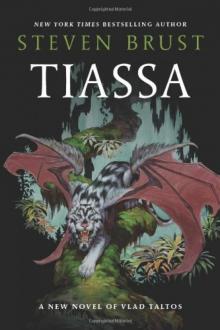 Tiassa
Tiassa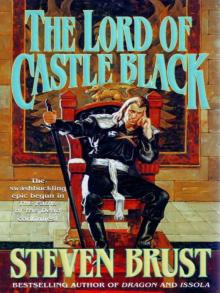 The Lord of Castle Black
The Lord of Castle Black To Reign in Hell: A Novel
To Reign in Hell: A Novel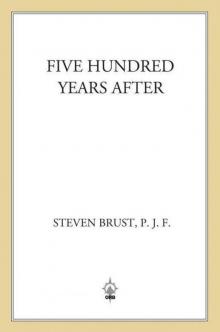 Five Hundred Years After (Phoenix Guards)
Five Hundred Years After (Phoenix Guards) The Book of Dzur: Dzur ; Jhegaala
The Book of Dzur: Dzur ; Jhegaala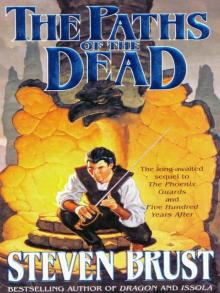 The Paths of the Dead
The Paths of the Dead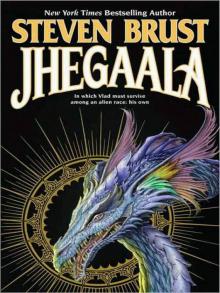 Jhegaala
Jhegaala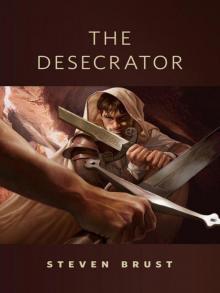 The Desecrator: A Tor.com Original
The Desecrator: A Tor.com Original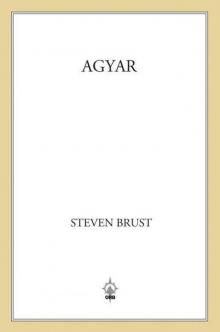 Agyar
Agyar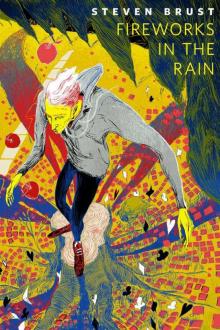 Fireworks in the Rain
Fireworks in the Rain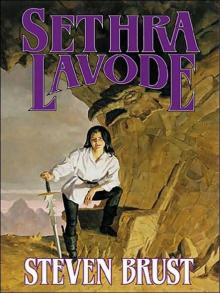 Sethra Lavode
Sethra Lavode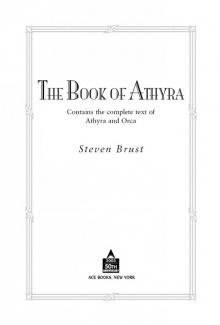 The Book of Athyra
The Book of Athyra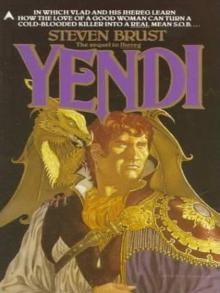 Yendi
Yendi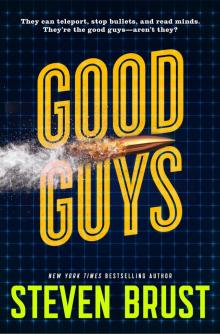 Good Guys
Good Guys The Book of Jhereg
The Book of Jhereg Cowboy Feng's Space Bar and Grille
Cowboy Feng's Space Bar and Grille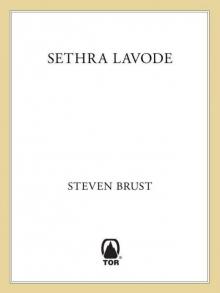 Sethra Lavode (Viscount of Adrilankha)
Sethra Lavode (Viscount of Adrilankha) My Own Kind of Freedom
My Own Kind of Freedom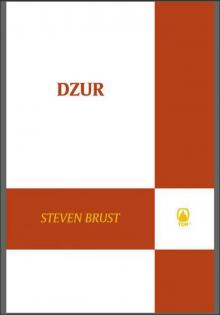 Dzur (Vlad Taltos)
Dzur (Vlad Taltos) The Lord of Castle Black: Book Two of the Viscount of Adrilankha
The Lord of Castle Black: Book Two of the Viscount of Adrilankha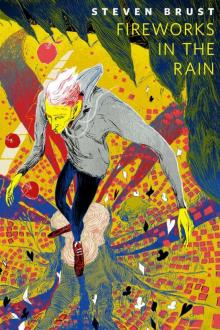 Fireworks in the Rain: A Tor.Com Original
Fireworks in the Rain: A Tor.Com Original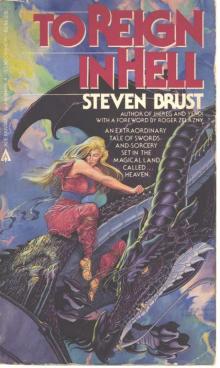 To Reign In Hell
To Reign In Hell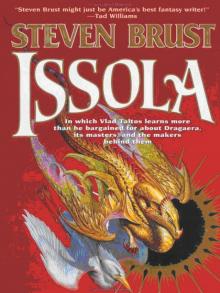 Issola
Issola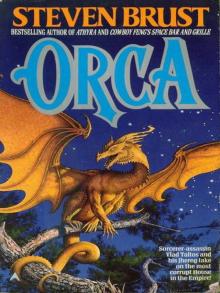 Orca
Orca Issola (Vlad Taltos)
Issola (Vlad Taltos)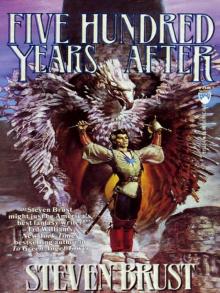 Five Hundred Years After
Five Hundred Years After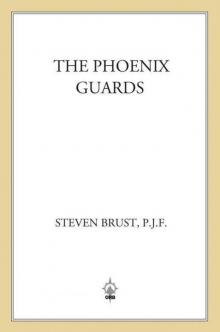 The Phoenix Guards
The Phoenix Guards Taltos
Taltos![[Vlad Taltos 06] Athyra Read online](http://i1.bookreadfree.com/i1/03/24/[vlad_taltos_06]_athyra_preview.jpg) [Vlad Taltos 06] Athyra
[Vlad Taltos 06] Athyra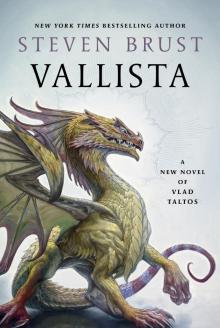 Vallista--A Novel of Vlad Taltos
Vallista--A Novel of Vlad Taltos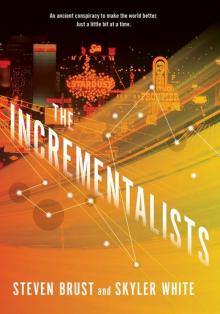 The Incrementalists
The Incrementalists![[Vlad Taltos 04] Taltos Read online](http://i1.bookreadfree.com/i/03/24/[vlad_taltos_04]_taltos_preview.jpg) [Vlad Taltos 04] Taltos
[Vlad Taltos 04] Taltos![[Vlad Taltos 03] Teckla (v 1.1) Read online](http://i1.bookreadfree.com/i1/03/27/[vlad_taltos_03]_teckla_v_1_1_preview.jpg) [Vlad Taltos 03] Teckla (v 1.1)
[Vlad Taltos 03] Teckla (v 1.1) The Book of Taltos
The Book of Taltos The Paths of the Dead (Viscount of Adrilankha)
The Paths of the Dead (Viscount of Adrilankha) Jhegaala (Vlad Taltos)
Jhegaala (Vlad Taltos)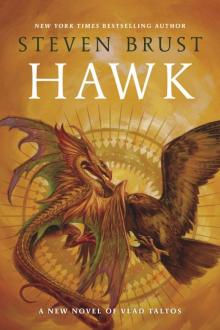 Hawk (Vlad)
Hawk (Vlad)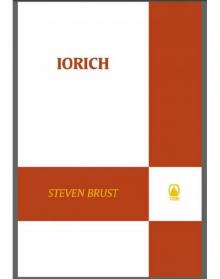 Iorich
Iorich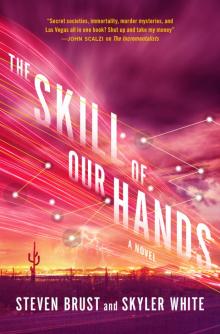 The Skill of Our Hands--A Novel
The Skill of Our Hands--A Novel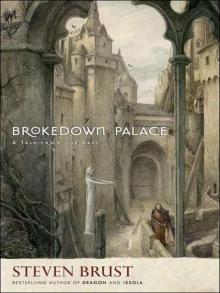 Brokedown Palace
Brokedown Palace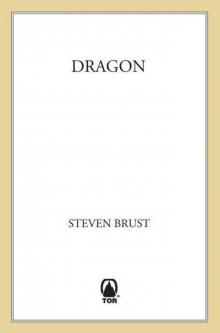 Dragon (Vlad Taltos)
Dragon (Vlad Taltos) Dragon
Dragon Athyra
Athyra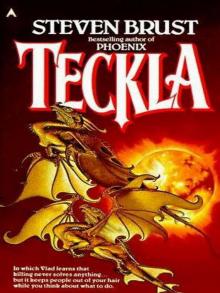 Teckla
Teckla Dzur
Dzur